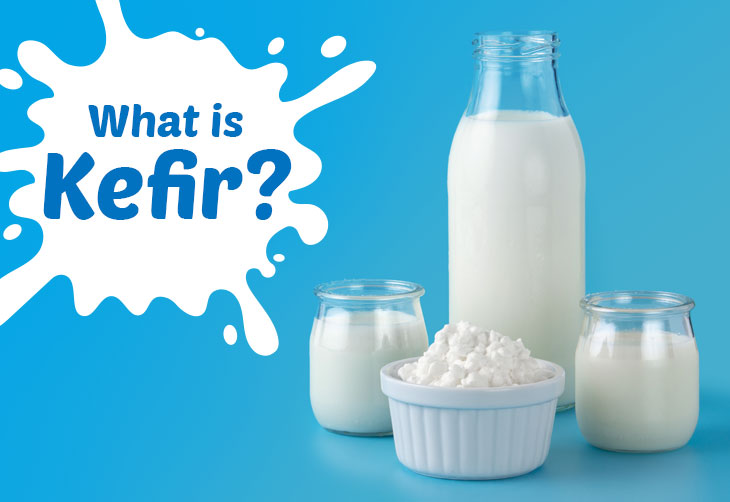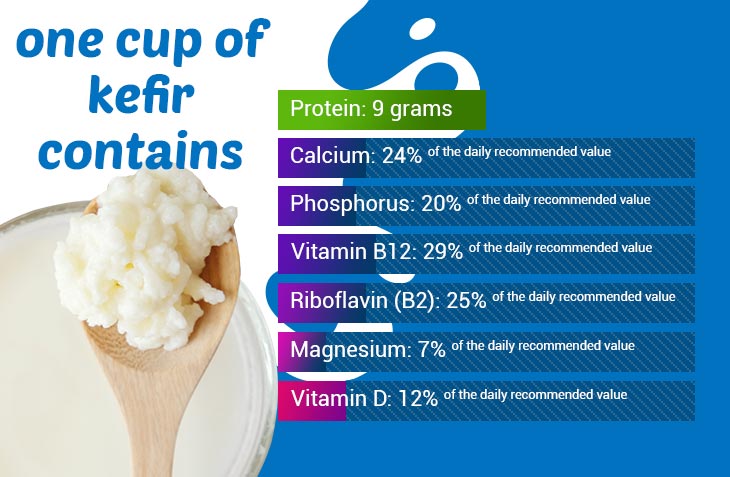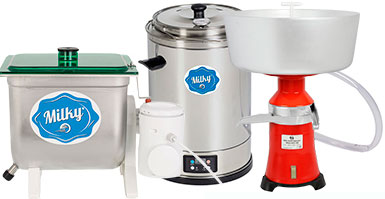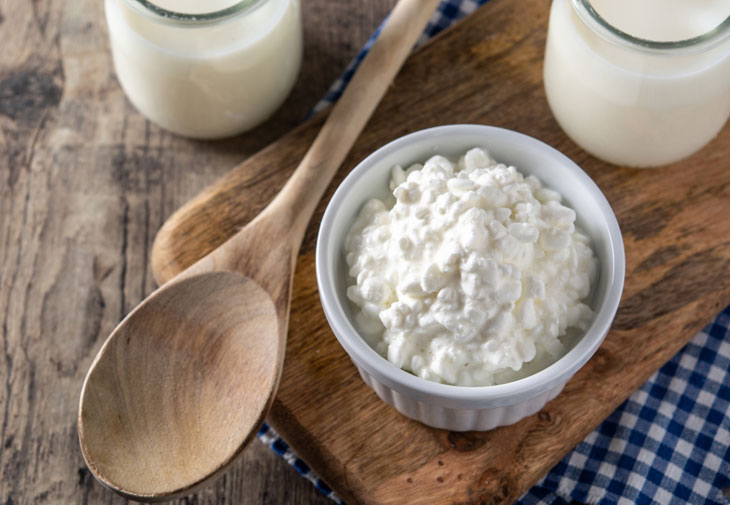Do you want to improve your digestion and gut health, make your bones stronger and even lose weight? Then you should add kefir to your daily diet!
Kefir might sound somewhat exotic to you, but we believe you should try to include this drink in your diet—especially if you’re familiar with kombucha or other fermented foods. The taste is quite mild and kefir brings so many health benefits to the table.

What is kefir?
Kefir is a fermented milk drink that originated in North Caucasus. It is very popular in Asia and Eastern Europe. It has a thick, creamy and slightly bubbly fermented texture as well as a mild sour taste. You can drink kefir as is, add your favorite sweetener to it or even use it for cooking pancakes, baking and more!

Craving some ice cream? Make it at home! Here is how: https://milkyday.com/blog/2021/07/22/how-to-make-homemade-ice-cream-from-milk/
Health benefits of kefir
This drink offers many health benefits.

It contains many nutrients
Here are all the nutrients contained in just one cup of kefir:
- Protein: 9 grams
- Calcium: 24% of the daily recommended value
- Phosphorus: 20% of the daily recommended value
- Vitamin B12: 29% of the daily recommended value
- Riboflavin (B2): 25% of the daily recommended value
- Magnesium: 7% of the daily recommended value
- Vitamin D: 12% of the daily recommended value
Yes, all this goodness is in just one cup of this drink! You basically can replace your multi-nutrient supplement with kefir.
It’s a powerful probiotic
We’re somewhat used to yogurt being a probiotic, and it is a good one. Kefir just happens to be even more powerful. Kefir grains contain up to 61 strains of bacteria and yeasts. This makes the drink a very rich and diverse source of probiotics—especially compared to other fermented dairy products that usually contain fewer strains and no yeasts. That’s why kefir is so good for your gut health.
Kefir significantly improves digestive function, reduces bloating and even speeds up your metabolism so that your body can process food faster. That’s why doctors in Eastern Europe and Asia often recommend that patients with gut illnesses add kefir to their diet.

It helps you fight infections
It’s getting better and better, isn’t it? Kefir is a true superfood that can also help protect against harmful bacteria thanks to the Lactobacillus kefiri probiotic it contains. It can help you fight Salmonella, Helicobacter pylori, E. coli and other harmful bacteria. Also, kefir contains a type of carbohydrate called Kefiran that improves your protection against nasty bacteria.
It strengthens bones and prevents osteoporosis
As a great source of calcium and vitamin K2—the latter helps the body process calcium—kefir is an ideal drink to keep your bones healthy. It improves the quality of bone tissue, thus making your bones denser and stronger. As a result, kefir can make you less prone to fractures.
Thanks to this, kefir also can reduce the risk of osteoporosis (a deterioration of bone tissue that increases the risk of fractures). This illness is a very big concern in Western countries—especially for older women. So it’s great news that a single cup of kefir per day can help prevent bone density issues.

It’s suitable for lactose-intolerant people
Thanks to the fermentation process, the lactose sugar that milk contains turns into lactic acid. That’s why people who suffer from lactose intolerance can surprisingly find themselves feeling OK after consuming kefir.
Of course, bear in mind that the fermentation process doesn’t make kefir a completely lactose-free drink. It just significantly reduces the amount of lactose sugar, which is the cause of lactose-intolerance symptoms. If kefir from cow’s milk still makes you experience discomfort, you can try goat or sheep kefir since milk from these animals contains less lactose sugar than milk from cows. And if the issue still bothers you, it’s always possible to make kefir from plant-based milk.

It may ease allergy and asthma symptoms
Both asthma and allergies are caused by an inflammatory process. Research shows that kefir can reduce inflammation in the body. Therefore, it might be helpful for people who struggle with allergies and asthma. However, the research is incomplete and we wouldn’t recommend putting too much faith in kefir in this case.
Nevertheless, this dairy drink can definitely become a useful and healthy addition to your diet.
It can help you lose weight
While being highly nutritious, kefir is low in calories. One cup contains about 104 calories, 11.6 grams of carbs and 2-3 grams of fat (depending on the type of milk used to make it). Despite being a low-calorie drink, kefir is incredibly filling too. So if you feel hungry at night and don’t want to binge-eat, a cup of kefir can save the day.
We’ve mentioned that kefir can help speed up your metabolism. Here is a little tip for you: Try adding one teaspoon each of ginger powder and cinnamon per cup of kefir (depending on your tolerance of these spices). Such a drink can greatly boost your metabolism and help you stay fit.
How to make kefir at home
Now, let’s see how you can make this dairy drink at home. The process is fairly straightforward. Frankly, it is quite difficult to mess it up.

You will need:
- 1 pint of milk of your choice
- ½ tsp kefir grains
- 1 slice of lemon or 1 drop of lemon oil (optional)
- A fine-mesh non-metal strainer
- A non-metal bowl
- Paper towels or coffee filters (or a clip-top jar)
Step 1
Add the milk and kefir grains to a jar. Cover the jar with paper towels or coffee filters and secure them with a rubber band. This will help prevent bugs and dust from getting into your kefir. If you’re using a clip-top jar, you will just need to close the lid without using any paper towels or coffee filters.
Step 2
Put the jar in a warm and dark place. The temperature should be 65-85°F (18-29°C). Leave the mixture to ferment for 18-24 hours. It’s easy to tell when your kefir has already fermented. The mixture will be thicker and smell of fermented food. If there is yellowish liquid that has separated from everything else, that’s OK. It just means that next time you will need to either use more milk or reduce the fermentation time.
Step 3
Place a strainer over a bowl. It’s important to use non-metal items because metal can negatively impact the quality and taste of kefir. If you don’t have a non-metal strainer or its mesh is not fine enough, you can put a thin kitchen towel inside.
Pour your kefir mixture into the strainer while stirring it with a non-metal spoon, gently pushing it through the mesh. When all the liquid appears in the bowl, you will be left with kefir grains in your strainer. Just add them to another pint of milk and you can start the fermentation process all over again.
Step 4
It’s time to consume your homemade kefir! Drink it plain or add lemon slices or lemon oil for some additional freshness. You can play around with mint and sweeteners as well. Adjust the kefir to your taste without any worries.
Homemade kefir will stay fresh in the fridge for 7-10 days. If you somehow manage to store your kefir for longer, there is no need to throw it away. Use it as a base for fluffy pancakes or cake batter!
An alternative method
While kefir doesn’t need as much warmth as, say, yogurt to ferment, it can be tricky to keep it at the required temperature during the winter and summer. Also, not everyone might like the fermentation smell passing through the paper towels or coffee filters you used to cover the jar.
A milk pasteurizer will automatically keep the mixture within the required temperature range while also protecting it from any dust or bugs. You can also use this machine to make yogurt and other fermented dairy products. And of course, it’s irreplaceable for properly pasteurizing fresh milk. As you might know, all fermented dairy foods require you to use pasteurized milk, as any foreign bacteria might spoil the process or be harmful to you. So if you want to make fresh milk safe without killing all the nutrients it contains by boiling it, a milk pasteurizer is a must-have for your kitchen.

Learn how to make yogurt in a milk pasteurizer at home: https://milkyday.com/blog/2018/07/18/how-to-make-yogurt-in-a-pasteurizer/
You can check out all the milk pasteurizers we offer to find the one that fits your needs. If you need any help with choosing one, we are always ready to assist you. Just drop us a line!
We hope you will enjoy your homemade kefir and it brings you numerous health benefits!


